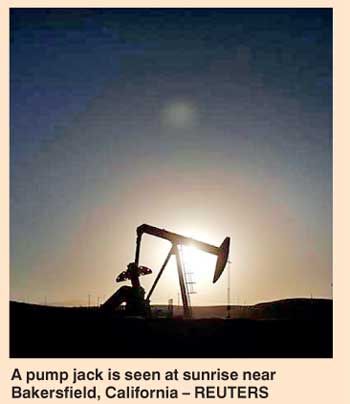Thursday Feb 26, 2026
Thursday Feb 26, 2026
Tuesday, 7 July 2015 02:17 - - {{hitsCtrl.values.hits}}
SINGAPORE (Reuters): Commodity prices dropped sharply on Monday, compounding worries about oversupply, after Greece rejected terms for a bailout and top consumer China unleashed emergency measures over the weekend to prevent a full-blown stock market crash.
Shanghai copper was down 3.6% by 0652 GMT in its steepest daily drop in more than five months, while prices on the London Metal Exchange hit their weakest since early-February at $5,520 a ton.
Oil markets also fell, dropping to their weakest in more than two months on both sides of the Atlantic.
Brent shed 1.6% to hit a low of $59.35 per barrel and US crude touched a low of $59.44, reacting to worries about the global  economy as the euro slid after the Greek vote against austerity measures endangered its future in the single currency.
economy as the euro slid after the Greek vote against austerity measures endangered its future in the single currency.
“As far as Greece is concerned, if we are going to see a drawn-out period of uncertainty, that may be negative for demand. But closer to hand is the possibility of a stronger US dollar, which is a negative for oil,” said Ric Spooner, chief analyst at CMC Markets in Sydney.
A strong dollar puts pressure on oil markets as it makes fuel more expensive for countries using different currencies.
Adding to falls in Asia, commodities were sucked into China’s market turmoil that has seen shares fall by as much as 30% since June amidst an economy that is growing at its slowest pace in a generation.
While Chinese stocks rose on Monday following the emergency measures at the weekend, the gains quickly ran out of steam.
Chinese steel prices are now at their lowest since the peak of the global financial crisis in 2009, with futures down more than two-thirds since then to around 2,000 yuan per ton, and almost 15% below highs touched in mid-June.
Iron ore – steel’s main raw material – has fallen about 17% since mid-June to around $54 a ton.
“Iron ore capped the biggest weekly loss since April as iron ore shipments surged (and) data showed a slowdown in China’s steel industry and China’s equity market fell sharply,” ANZ bank said.
Oil, iron ore and coal are already suffering from oversupply, with major producers like Australia (coal and iron ore), the Middle East, Russia and the United States (oil), all seeing near record output just as demand slows.
With economic uncertainty rising, gold benefited from its safe-haven status. Prices of the metal are up by almost 1% from last week’s low at around $1,168 per ounce.
“We think that the short-term uncertainty generated by the Greek vote will likely benefit gold and suspect that we could see more appreciation over the next few days. However ... lower oil prices and a stronger dollar should keep gold’s advance somewhat in check,” said INTL FCStone analyst Edward Meir.